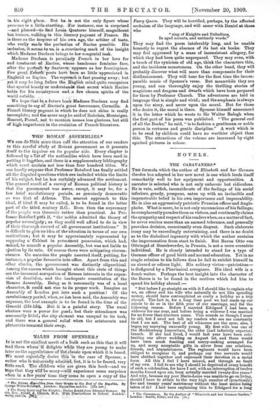TEEM BOMA* ASSFMBLIES.*
WE can &Mlle more than call the attention of our readers to this careful- efudy of Roman government as it presents itself to the inquirer on its popular side. Every chapter is followed by eta of the authorities, which have been used in putting it toggther,n,nd there,is; a supplementary bibliography which must contain -not less than four hundred titles. We can hardly seipposeihat Profeesoe-Boteford has finally settled all the disputed questions which are included within the limits of his subject, but he has certainly advanced the settlement. The general result of a survey of Roman political history is that the government was never, except, it may be, for a few brief revolutionary periods, as genuinely democratic as was that f, Athens. The: nearest approach to this ideal, if ideal it may be callecl, is to be found in. the latter part of the third century B4O, -Even then the supremacy of the peoplo was theoretic rather than practical. As Pro- fessor Botsfo: rd PIA'S if, " the- nobles admitted the theory of popular sovereignty; as the,y'couid well afford to do in view of their thorough control of all- government institutions." It is difficult to give an idea of theiituation in terms of our own institutions ; but it may- be- approximately represented by slupposing a' Cakinet in permanent possession, which had, indeed, to consult a popular Assembly, but was not liable to ejection by its vote. Of °mime there were mitigating circum- -stances. On. nacasion the people asserted itself, putting, for instance, a. popular favourite into office. Apart from this and other checks, the- government was distinctly oligarchical Among the causes which brought about this state of things -are the incessant oconpation of Roman interests in the expan- sion. of dominion, and the . inadequate constitution of the Roman Assembly., Being as- it -necessarily was of a local -character, it could not rise to its proper work. Imagine an Assembly of London put into- such a position ! Of the revolutionary peried, when, as ban been said, the Assembly was supreme, the best example is to be found in the time of the .Gra,cchi (134-134),, But it• ie. a painful story. The rural -electors were at power for , good; but their attendance. was necessarily fitfula the city element was unequal to its task, and there was- a. general relief when the aristocrats and plutocrats resumed their sway/
























































 Previous page
Previous page